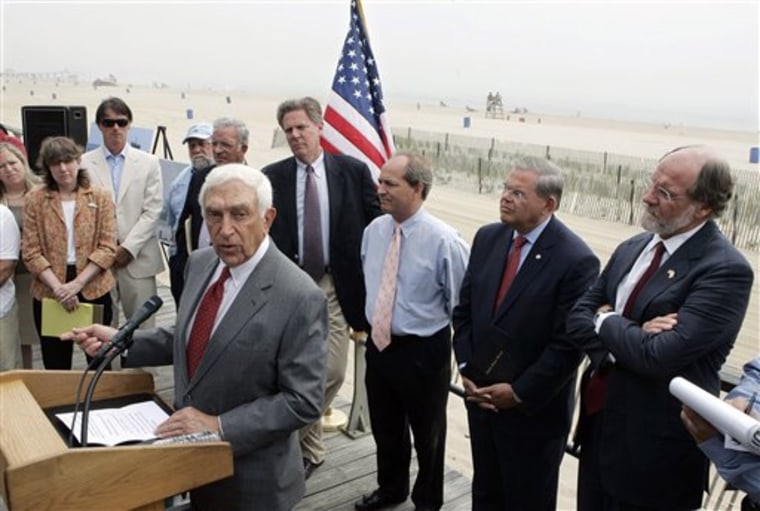With oil and gas drilling heating up as an issue in the presidential race, environmentalists and the governor reiterated their opposition to tapping reserves off the state's coast, saying it would endanger the environment and the tourism industry on which New Jersey is so dependent.
"It is a dark, dark day for the natural coast. Some might say it's as black as oil," said Cindy Zipf, executive director of Clean Ocean Action, who joined environmental and fishing groups at a news conference Wednesday on the Avon boardwalk. Gov. Jon Corzine reiterated his opposition Tuesday in a letter to U.S. Interior Secretary Dirk Kempthorne.
The House late Tuesday passed legislation that would open waters 50 miles off the Pacific and Atlantic coasts to oil and natural gas development — if the adjacent states agree to go along. The legislation now goes to the Senate.
New Jersey — joined by California and North Carolina — has so far refused to go along, meaning exploration could take place no closer than 100 miles offshore under the current proposal.
Tourism touted instead
Tim Gallagher, Avon's borough administrator, said tourism is the lifeblood of his community.
"This year we had 600,000 visitors," he said. "We're very proud of our beach. It's clean, the water is clear. People come here for that reason."
Speaker after speaker said it was foolish to drill for oil off the East Coast when the United States exports more than a half-billion barrels of oil each year. This year, the country is on pace to send 681 million barrels abroad, Zipf said.
"That, to me, is criminal," said Jim Lovegren, a commercial fisherman from Point Pleasant Beach. "If you want to drill here, you don't do it until you say that not a single barrel of American oil goes overseas," he said.
So far, the U.S. Senate has indicated it has no intention of going as far as the House in expanding offshore oil and gas drilling beyond the western Gulf of Mexico, where energy companies have been pumping oil and gas for decades.
At least two proposals being crafted in the Senate would allow drilling in some areas along the southern Atlantic from Virginia to Georgia. However, the Pacific and remainder of the Atlantic seaboard would not be affected.
Pro-drilling argument: Safer than ships
Michael Doherty, a Republican state assemblyman from Hunterdon County, supports offshore drilling as essential to "our economic and national security."
"It's pretty evident that we can't rely on the rest of the world to meet the United States' energy needs," he said. "We need to do everything we can — drilling, nuclear, alternative energy, conservation — and we need to do it now."
Doherty said transporting oil through underground pipes is safer than carrying it aboard supertankers.
"If you want more Exxon Valdez-like events, then continue to oppose offshore drilling," he said. "Right now in New Jersey, oil comes into Port Newark in tankers. If you want that to continue, then continue to oppose offshore drilling."
Jeff Tittel, executive director of the New Jersey chapter of the Sierra Club, said no amount of drilling can solve America's energy crisis.
"You can't drill your way out; it's impossible," he said. "The U.S. has 3 percent of the world's oil reserves but uses 25 percent of the world's oil."
